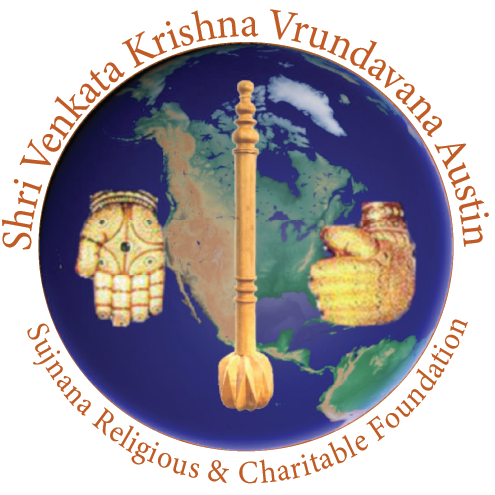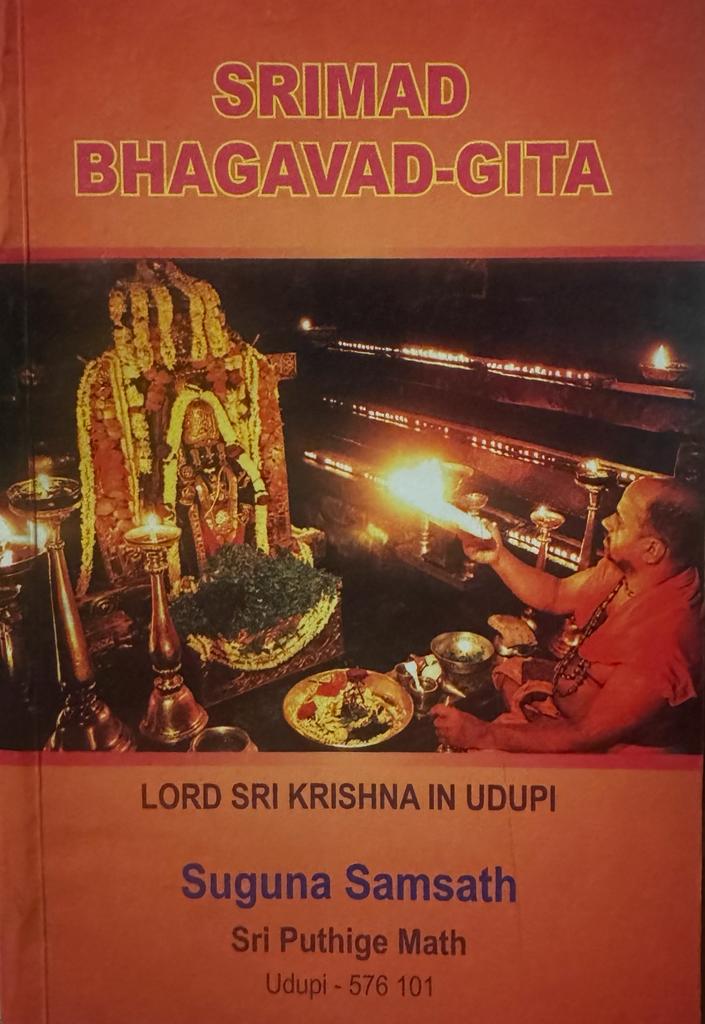हरि सर्वोत्तम । वायु जीवोत्तम । श्री गुरुभ्यो नमः ।

*NOTE: Choose desired output script using Aksharamukha (screen top-right) to see Vedaswara.
Bhagavad Gita 1: Arjunaviṣāda Yoga
हरि सर्वोत्तम । वायु जीवोत्तम । श्री गुरुभ्यो नमः ।
अथ प्रथमोऽध्यायः
अर्जुनविषादयोगः
धृतराष्ट्र उवाच
धर्मक्षेत्रे कुरुक्षेत्रे समवेता युयुत्सवः ।
मामकाः पाण्डवाश्चैव किमकुर्वत सञ्जय ॥ १।१ ॥
Dhṛtarāṣṭra said –
O Sañjaya, in Kurukṣetra, the field of righteousness, what did they – my people and Pāṇḍavās who had gathered together, eager for battle, do?
सञ्जय उवाच
दृष्ट्वा तु पाण्डवानीकं व्यूढं दुर्योधनस्तदा ।
आचार्यमुपसङ्गम्य राजा वचनमब्रवीत् ॥ १।२ ॥
Sañjaya said –
Then, King Duryodhana, having seen the army of the Pāṇḍavās drawn up in military array went to his teacher (Droṇa) and spoke the following words.
पश्यैतां पाण्डुपुत्राणामाचार्य महतीं चमूम् ।
व्यूढां द्रुपदपुत्रेण तव शिष्येण धीमता ॥ १।३ ॥
O preceptor – see this mighty army of the sons of Pāṇḍu, arrayed by the son of Drupada, your wise pupil.
अत्र शूरा महेष्वासा भीमार्जुनसमा युधि ।
युयुधानो विराटश्च द्रुपदश्च महारथः ॥ १।४ ॥
Here are the heroes and great archers who are equal to Bhima and Arjuna in battle (viz.) Yuyudhāna, Virāṭa and Drupada, warriors ranking as Mahārathās.
धृष्टकेतुश्चेकितानः काशिराजश्च वीर्यवान् ।
पुरुजित्कुन्तिभोजश्च शैब्यश्च नरपुङ्गवः ॥ १।५ ॥
Dhṛṣṭaketu, Cekitāna and the King of Kāśi, Purujit and Kuntibhoja, Śaibya – the most powerful among men.
युधामन्युश्च विक्रान्त उत्तमौजाश्च वीर्यवान् ।
सौभद्रो द्रौपदेयाश्च सर्व एव महारथाः ॥ १।६ ॥
Ẏudhāmanyu the brave, Uttamauja the heroic, Abhimanyu the son of Subhadra, and the sons of Draupadi are all unquestionably Mahārathas.
अस्माकं तु विशिष्टा ये तान्निबोध द्विजोत्तम ।
नायका मम सैन्यस्य संज्ञार्थं तान्ब्रवीमि ते ॥ १।७ ॥
O best of Brahmins, know those chief leaders of my army, whom I shall now mention, for your information.
भवान्भीष्मश्च कर्णश्च कृपश्च समितिञ्जयः ।
अश्वत्थामा विकर्णश्च सौमदत्तिस्तथैव च ॥ १।८ ॥
Of course, yourself, Bhīṣma, Karṇa, and Kṛpa victorious in battle; Aśvatthāmā, Vikarṇa, and Bhūriśravas, the son of Saumadatta.
अन्ये च बहवः शूरा मदर्थे त्यक्तजीविताः ।
नानाशस्त्रप्रहरणाः सर्वे युद्धविशारदाः ॥ १।९ ॥
And many other heroes, who have given up (as it were) their lives for my sake, all armed with diverse weapons are experts in war.
अपर्याप्तं तदस्माकं बलं भीष्माभिरक्षितम् ।
पर्याप्तं त्विदमेतेषां बलं भीमाभिरक्षितम् ॥ १।१० ॥
Inadequate appears the army of ours protected by Bhīṣma, while the army of Pāṇḍavās protected by Bhīma, appears adequate.
अयनेषु च सर्वेषु यथाभागमवस्थिताः ।
भीष्ममेवाभिरक्षन्तु भवन्तः सर्व एव हि ॥ १।११ ॥
Therefore, let all of you standing firmly in your respective portions and vantage-points guard mainly Bhīṣma.
तस्य सञ्जनयन्हर्षं कुरुवृद्धः पितामहः ।
सिंहनादं विनद्योच्चैः शङ्खं दध्मौ प्रतापवान् ॥ १।१२ ॥
To cheer him, the aged and brave Kuru, the grandsire of great valor Bhīṣma, uttered a war cry like the roar of a lion and blew his conch.
ततः शङ्खाश्च भेर्यश्च पणवानकगोमुखाः ।
सहसैवाभ्यहन्यन्त स शब्दस्तुमुलोऽभवत् ॥ १।१३ ॥
Then conches, kettle drums, tabors, drums, and trumpets were sounded simultaneously. Their sound was tremendously tumultuous.
ततः श्वेतैर्हयैर्युक्ते महति स्यन्दने स्थितौ ।
माधवः पाण्डवश्चैव दिव्यौ शङ्खौ प्रदध्मतुः ॥ १।१४ ॥
Then seated in a magnificent chariot yoked to white horses, Śrī Kṛṣṇa and Arjuna blew their own divine conches.
पाञ्चजन्यं हृषीकेशो देवदत्तं धनञ्जयः ।
पौण्ड्रं दध्मौ महाशङ्खं भीमकर्मा वृकोदरः ॥ १।१५ ॥
Hṛṣīkeśa blew his Pāñcajanya, Dhanañjaya his Devadatta, and Vṛkodara Bhīma of awe inspiring deeds blew his mighty conch Pauṇḍra.
अनन्तविजयं राजा कुन्तीपुत्रो युधिष्ठिरः ।
नकुलः सहदेवश्च सुघोषमणिपुष्पकौ ॥ १।१६ ॥
The son of Kunti, King Yudhiśṭhira blew his conch Anantavijaya, and Nakula and Sahadeva blew Sughoṣa and Maṇipuṣpaka.
काश्यश्च परमेष्वासः शिखण्डी च महारथः ।
धृष्टद्युम्नो विराटश्च सात्यकिश्चापराजितः ॥ १।१७ ॥
And the King of Kasi, the excellent archer, and Śikhaṇḍī, Dhṛṣṭadyumna, the great Mahāratha Viṟāṭa and the invincible Sātyaki followed suit.
द्रुपदो द्रौपदेयाश्च सर्वशः पृथिवीपते ।
सौभद्रश्च महाबाहुः शङ्खान्दध्मुः पृथक्पृथक् ॥ १।१८ ॥
O King – Drupada, the sons of Draupadi, and the mighty armed son of Subhadra all blew their conches separately and individually.
स घोषो धार्तराष्ट्राणां हृदयानि व्यदारयत् ।
नभश्च पृथिवीं चैव तुमुलो व्यनुनादयन् ॥ १।१९ ॥
That terrible and tumultuous sound echoing through heaven and earth, rent the hearts of the sons of Dhṛtarāṣṭra.
अथ व्यवस्थितान्दृष्ट्वा धार्तराष्ट्रान् कपिध्वजः ।
प्रवृत्ते शस्त्रसम्पाते धनुरुद्यम्य पाण्डवः ॥ १।२० ॥
हृषीकेशं तदा वाक्यमिदमाह महीपते ।
O King! Arjuna the son of Pānḍu and whose chariot had a monkey in its banner, seeing the sons of Dhṛtarāṣṭra drawn up in battle array ready to shoot their missiles, took up his bow and spoke to Hṛṣīkeśa.
अर्जुन उवाच
सेनयोरुभयोर्मध्ये रथं स्थापय मेऽच्युत ॥ १।२१ ॥
Arjuna said –
O Acyuta, place my chariot at the centre between the two armies.
यावदेतान्निरीक्षेऽहं योद्धुकामानवस्थितान् ।
कैर्मया सह योद्धव्यमस्मिन् रणसमुद्यमे ॥ १।२२ ॥
So that I may survey those standing eager for battle and find out with whom I have to fight in the war about to commence.
योत्स्यमानानवेक्षेऽहं य एतेऽत्र समागताः ।
धार्तराष्ट्रस्य दुर्बुद्धेर्युद्धे प्रियचिकीर्षवः ॥ १।२३ ॥
Let me also look at those who have gathered here ready to fight just to please the evil-minded son of Dhṛtarāṣṭra .
सञ्जय उवाच
एवमुक्तो हृषीकेशो गुडाकेशेन भारत ।
सेनयोरुभयोर्मध्ये स्थापयित्वा रथोत्तमम् ॥ १।२४ ॥
भीष्मद्रोणप्रमुखतः सर्वेषां च महीक्षिताम् ।
उवाच पार्थ पश्यैतान्समवेतान्कुरूनिति ॥ १।२५ ॥
Sañjaya said –
Thus addressed by Guḍākeśa (i.e., one who has conquered sleep – Arjuna),
O Dhṛtarāṣṭra, Ḥṛśīkeśa placed the best of chariots at the centre between the two armies in full view of Bhīśma, Ḍroṇa and all other rulers of the Earth and said — O Pārtha! behold these Kurus drawn up in battle array.
तत्रापश्यत्स्थितान्पार्थः पितॄनथ पितामहान् ।
आचार्यान्मातुलान्भ्रातॄन्पुत्रान्पौत्रान्सखींस्तथा ॥ १।२६ ॥
श्वशुरान्सुहृदश्चैव सेनयोरुभयोरपि ।
तान्समीक्ष्य स कौन्तेयः सर्वान्बन्धूनवस्थितान् ॥ १।२७ ॥
कृपया परयाविष्टो विषीदन्निदमब्रवीत् ।
There, Arjuna saw fathers (uncles), grand fathers, teachers, maternal uncles, cousins, sons, grand sons, fathers-in- law and comrades, practically all the relations arrayed in battle. Deeply moved by great compassion and saddened by the sight, he spoke thus.
अर्जुन उवाच
दृष्ट्वेमं स्वजनं कृष्ण युयुत्सुं समुपस्थितम् ॥ १।२८ ॥
सीदन्ति मम गात्राणि मुखं च परिशुष्यति ।
वेपथुश्च शरीरे मे रोमहर्षश्च जायते ॥ १।२९ ॥
Arjuna said –
Seeing these – my kinsmen, O Kṛṣṇa, arrayed and eager to fight, my limbs quail and my mouth gets parched. My body shakes and my hairs stands on its end.
गाण्डीवं स्रंसते हस्तात्त्वक्चैव परिदह्यते ।
न च शक्नोम्यवस्थातुं भ्रमतीव च मे मनः ॥ १।३० ॥
The Gāṇḍīva bow slips from my hand and my skin burns all over. I am not able even to stand up – my mind is whirling, as it were.
निमित्तानि च पश्यामि विपरीतानि केशव ।
न च श्रेयोऽनुपश्यामि हत्वा स्वजनमाहवे ॥ १।३१ ॥
O Keśava – I see around me evil omens. I see no good in killing my kinsmen in battle.
न काङ्क्षे विजयं कृष्ण न च राज्यं सुखानि च ।
किं नो राज्येन गोविन्द किं भोगैर्जीवितेन वा ॥ १।३२ ॥
O Kṛṣṇa, I do not long for victory, kingdom, or pleasure. Of what use is a kingdom to us, or enjoyment, or even life?
येषामर्थे काङ्क्षितं नो राज्यं भोगाः सुखानि च ।
त इमेऽवस्थिता युद्धे प्राणांस्त्यक्त्वा धनानि च ॥ १।३३ ॥
Those for whose sake we desire to secure the kingdom, enjoyments, and pleasures, all stand here for battle having staked and being prepared to risk their lives and riches.
आचार्याः पितरः पुत्रास्तथैव च पितामहाः ।
मातुलाः श्वशुराः पौत्राः श्यालाः सम्बन्धिनस्तथा ॥ १।३४ ॥
Teachers, fathers, sons, and also grand-fathers, maternal uncles, fathers-in-law, grandsons, brothers-in-law, and other kinsmen.
एतान्न हन्तुमिच्छामि घ्नतोऽपि मधुसूदन ।
अपि त्रैलोक्यराज्यस्य हेतोः किं नु महीकृते ॥ १।३५ ॥
O Madhusūdana, even for the sake of the kingship of the three worlds, I do not wish to kill these, even though they attempt to kill me much less for this earth.
निहत्य धार्तराष्ट्रान्नः का प्रीतिः स्याज्जनार्दन ।
पापमेवाश्रयेदस्मान्हत्वैतानाततायिनः ॥ १।३६ ॥
In slaying the sons of Dhṛtarāṣṭra, O Janārdana, what good will come to us? Only sin will overtake us in slaying these, though they be reprobates and confirmed criminals.
तस्मान्नार्हा वयं हन्तुं धार्तराष्ट्रान्स्वबान्धवान् ।
स्वजनं हि कथं हत्वा सुखिनः स्याम माधव ॥ १।३७ ॥
Therefore, it does not behoove us to kill the sons of Dhṛtarāṣṭra our kinsmen, for how can we be happy, O Mādhava, after killing our own kith and kin ?
यद्यप्येते न पश्यन्ति लोभोपहतचेतसः ।
कुलक्षयकृतं दोषं मित्रद्रोहे च पातकम् ॥ १।३८ ॥
कथं न ज्ञेयमस्माभिः पापादस्मान्निवर्तितुम् ।
कुलक्षयकृतं दोषं प्रपश्यद्भिर्जनार्दन ॥ १।३९ ॥
Although they do not realise, being overpowered by greed, the evil arising from the destruction of the family and the heinousness of being treacherous to friends, which must surely compel us to turn away from such a sinful venture, especially when we perceive the evils arising from the destruction of families, O Janārdana.
कुलक्षये प्रणश्यन्ति कुलधर्माः सनातनाः ।
धर्मे नष्टे कुलं कृत्स्नमधर्मोऽभिभवत्युत ॥ १।४० ॥
If families perish, traditional family observances become extinct and when Dharma (righteousness) is lost, vice predominates and overpowers the entire family or clan.
अधर्माभिभवात्कृष्ण प्रदुष्यन्ति कुलस्त्रियः ।
स्त्रीषु दुष्टासु वार्ष्णेय जायते वर्णसङ्करः ॥ १।४१ ॥
Thus, evil-smitten, O Kṛṣṇa the family women become corrupt and when women get corrupted, O Vārṣṇeya, mixture of castes arises.
सङ्करो नरकायैव कुलघ्नानां कुलस्य च ।
पतन्ति पितरो ह्येषां लुप्तपिण्डोदकक्रियाः ॥ १।४२ ॥
Such mixture leads certainly to hell those who have destroyed the family and also the family itself; for their ancestors fall (into hell) deprived of rice balls and libations of water.
दोषैरेतैः कुलघ्नानां वर्णसङ्करकारकैः ।
उत्साद्यन्ते जातिधर्माः कुलधर्माश्च शाश्वताः ॥ १।४३ ॥
On account of these misdeeds of the authors of slayers of the family leading to the mixture of castes, the age-long caste traditions and family customs (Dharma) become extinct.
उत्सन्नकुलधर्माणां मनुष्याणां जनार्दन ।
नरके नियतं वासो भवतीत्यनुशुश्रुम ॥ १।४४ ॥
Of such as have lost their family tradition, we have heard, O Janārdana, their abode is surely in hell.
अहो बत महत्पापं कर्तुं व्यवसिता वयम् ।
यद्राज्यसुखलोभेन हन्तुं स्वजनमुद्यताः ॥ १।४५ ॥
Alas! Strange indeed we are engaged in committing a great sin in that, we, from greed for the pleasures of kingdom, have been getting ready to kill our own kinsmen.
यदि मामप्रतीकारमशस्त्रं शस्त्रपाणयः ।
धार्तराष्ट्रा रणे हन्युस्तन्मे क्षेमतरं भवेत् ॥ १।४६ ॥
Far more beneficial would it be for me if the sons of Dhṛtarāṣṭra weapons in hand, should slay me, unarmed and unresisting.
सञ्जय उवाच
एवमुक्त्वार्जुनः सङ्ख्ये रथोपस्थ उपाविशत् ।
विसृज्य सशरं चापं शोकसंविग्नमानसः ॥ १।४७ ॥
Sañjaya said –
Having thus spoken on the battlefield, Arjuna sat down on his seat in the chariot, casting away his bow and arrow, his mind overpowered by grief.
ॐ तत्सदिति श्रीमद्भगवद्गीतासूपनिषत्सु
ब्रह्मविद्यायां योगशास्त्रे श्रीकृष्णार्जुन संवादे
अर्जुनविषादयोगो नाम प्रथमोऽध्यायः ॥ १॥
Thus ends the First Chapter of the Upanisads of the Bhagavad Gīta entitled “Arjunaviṣāda Yoga”, the Yoga of Arjuna’s Despondency.
Reference: Srimad Bhagavad Gita pocket book published by Suguna Samsath with English translation by Shri Bannanje Govindacharya (Received with blessings from HH Shri Shri Sugunendra Tirtha Swamiji of Puthige Matha in Austin, TX, Nov 1997)
Transliterated by Krishna Rao Vijayanagar and Raghunath Rao
“Do your Best … and leave the Rest … “
॥ सर्वं श्री कृष्णार्पणं अस्तु ॥


